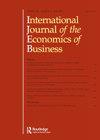销售能力有限的零售商的买方权力
IF 0.9
Q3 BUSINESS
International Journal of the Economics of Business
Pub Date : 2020-07-13
DOI:10.1080/13571516.2020.1792226
引用次数: 0
摘要
我们有两个上游企业各自生产不同的产品。商品需求是独立的、对称的、线性的。商品通过零售商卖给消费者。零售商销售的两种商品的数量不能超过行业的销售能力,在零售商之间是对称分布的。在给定行业销售能力的情况下,当零售商数量减少时,零售商规模变大,也就是说零售商的销售能力增加。因此,通过改变零售商的数量,我们可以检验反补贴力理论是否在我们的模型中成立,即越大的零售商从供应商那里获得更好的交易。我们得到了零售商数量越少,批发价格越低,只有在行业销售能力高的情况下。本文章由计算机程序翻译,如有差异,请以英文原文为准。
Buyer power of retailers with limited selling capacity
Abstract We have two upstream firms producing each one a different good. Demands of the goods are independent, symmetric and linear. Goods are sold to consumers through retailers. The units of both goods sold by retailers cannot exceed the industry selling capacity that it is distributed symmetrically among retailers. Taking as given the industry selling capacity, when the number of retailers decreases, they become bigger in the sense that their selling capacity increases. Therefore, changing the number of retailers, we can check whether the countervailing power theory, that states that bigger retailers obtain better deals from suppliers, holds in our model. We obtain that the lower the number of retailers, the lower the wholesale prices, only when the industry selling capacity is high.
求助全文
通过发布文献求助,成功后即可免费获取论文全文。
去求助
来源期刊
CiteScore
2.60
自引率
8.30%
发文量
9
期刊介绍:
International Journal of the Economics of Business presents original, peer reviewed research in economics that is clearly applicable to business or related public policy problems or issues. The term "business" is used in its widest sense to encompass both public and private sector—governmental, private non-profit and cooperative organizations, as well as profit-seeking enterprises. International Journal of the Economics of Business carries papers relating to three main spheres: The organization—to analyse and aid decision making and the internal organization of the business; The industry—to analyse how businesses interact and evolve within and across industries.

 求助内容:
求助内容: 应助结果提醒方式:
应助结果提醒方式:


